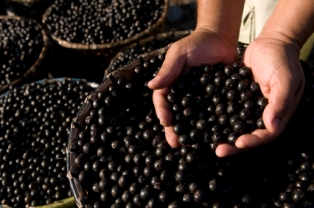Acai Supplies Yogurt with Greater Nutrient Density
Study:Â Probiotics, Fat Content Improved in Yogurt after Adding Acai Berry
The acai berry—billed as the superfood of superfoods—is highly touted for its ability to bring amazing results to the human body, like lowering cholesterol and enhancing energy. But according to new research from the International Dairy Journal, the acai berry benefits it’s own kind as well.
According to researchers, blending the acai berry with foods that have probiotics in them naturally increases the number of probiotics the food has, extends its shelf life, and improves its fat content.
To test the acai berry’s effectiveness, Brazilian researchers added acai pulp to skim milk that’s used in the production of yogurts.
After four weeks, when they compared the yogurt samples to samples that did not include acai pulp, the ones with the pulp had a greater number of probiotic cultures (L. acidophilus and B. longum, specifically).
Probiotics are all the rage in the health world these days, as these healthy forms of bacteria are highly beneficial to digestive health. They’re also great for the skin. Studies show that a high consumption of probiotics reduces the risk of eczema by up to 60 percent.
But the berry benefits didn’t end there. Further analysis found that the yogurts’ fat content improved. Over the four-week waiting period, the researchers observed an increase in the monounsaturated fat content of the yogurts containing acai berry.
The research comes out of Sao Paulo University in Brazil.
Studies like these helps to clarify why the acai berry is all the rage these days. But America really missed the boat on the acai (pronounced AH-sigh-EE), as it’s been something of nutritional staple for many, many years in Indian and Brazilian cultures.
Should you go about looking for a legitimate acai berry supplement to choose from: buyer beware. In August of 2009, Dr. Oz and Oprah Winfrey filed a joint lawsuit against several acai berry-selling supplement companies, alleging that the companies falsely attached their endorsement to their product (e.g. As Seen on Oprah).
At this point, it’s very difficult to know which products really contain acai and which are phony baloneys. ConsumerLab.com, a company that reviews the authenticity of natural supplements and the credibility of their health claims, says it’s “not currently possible to determine the amount and authenticity of acai.”
That being the case, use your best judgment when purchasing acai. Do your own independent research on the acai berry supplement your considering buying. What are other people are saying about that specific supplement in natural health forums?
If you’ve been taking acai for a while now, pay attention to how you feel. Do you really feel better? That’s great if you do, but the only way to know for sure is through scientific analysis (blood tests that measure your cholesterol, for example). So schedule a blood test with your doctor.
Until then, stay tuned for Mangano-approved acai supplements.
Sources:
foodnavigator.com
consumerlab.com
Related Posts
- “Magnificent” Magnesium Supplementation Boosts Bone Density, Researchers Conclude
- Essential Mineral Lowers Osteoporosis Risk by Raising Bone Density, Research Shows
- Parkinson’s Drugs Hold Greater Risk of a Serious Side Effect Than Previously Thought…
- Preschoolers Face Greater Risk of Side Effects from the drug Ritalin…
 
|
Enjoy this article? We guarantee your privacy. Your email address will NEVER be rented, traded or sold. |
Visit my new site: Self Help On The Web
 |
 |
Posted: February 21st, 2010 under antioxidants.
Tags: acai health benefits, acai scam, acai superfood







